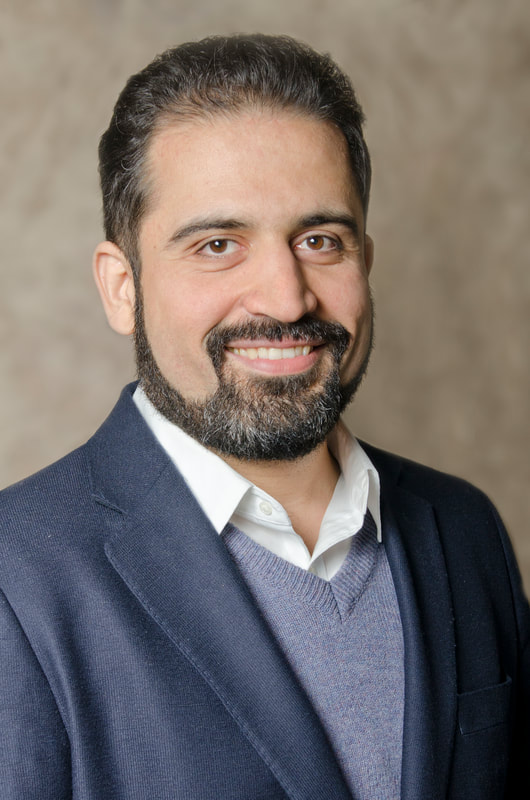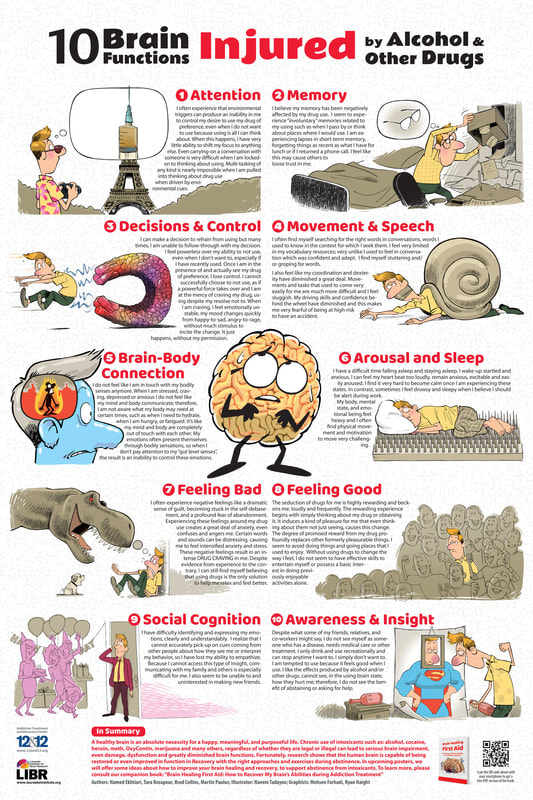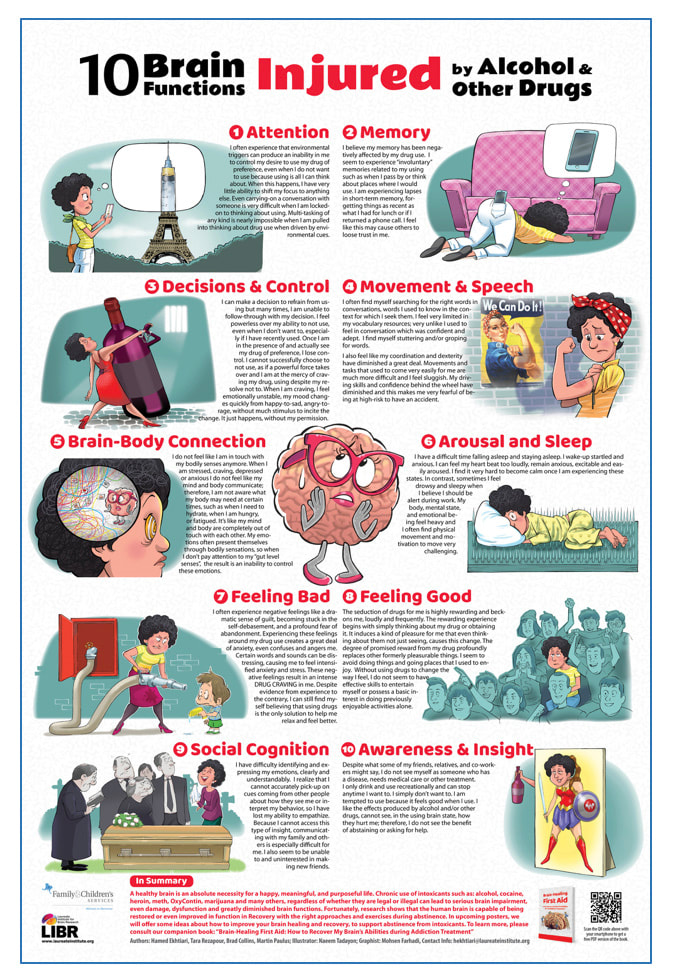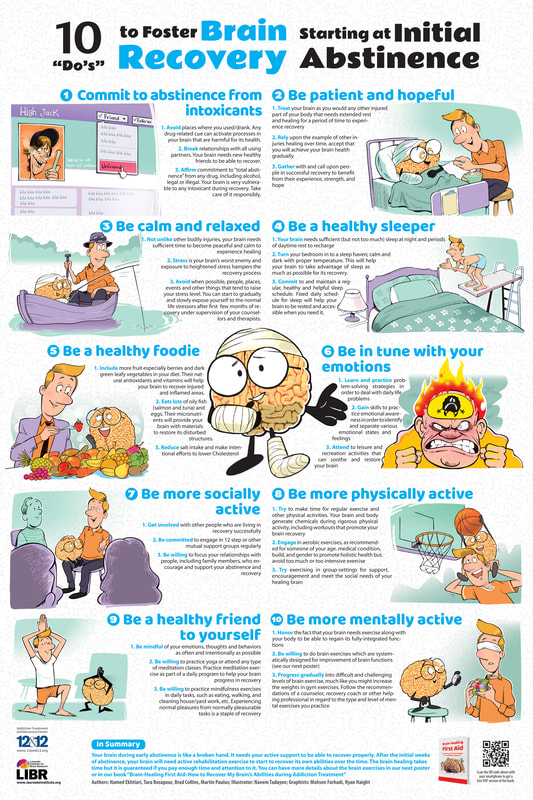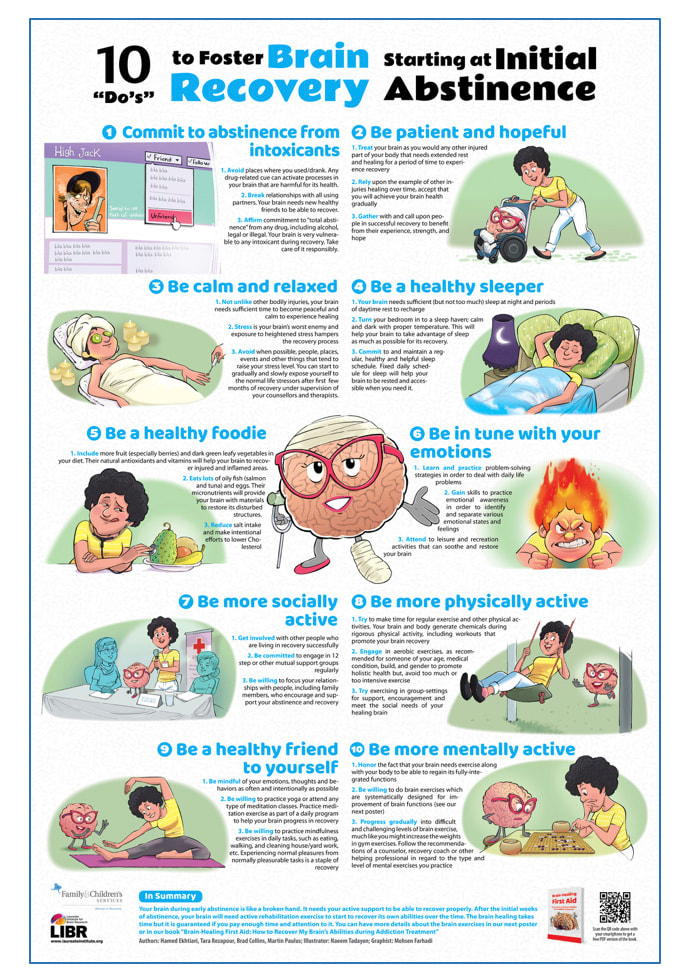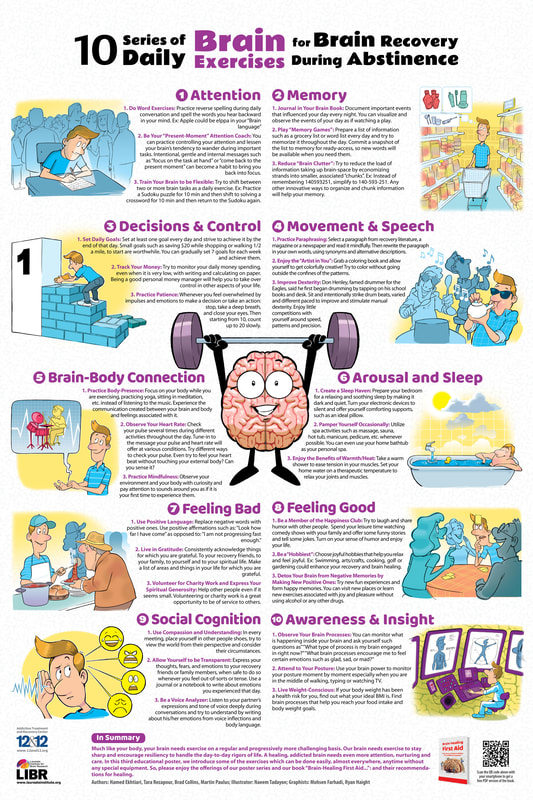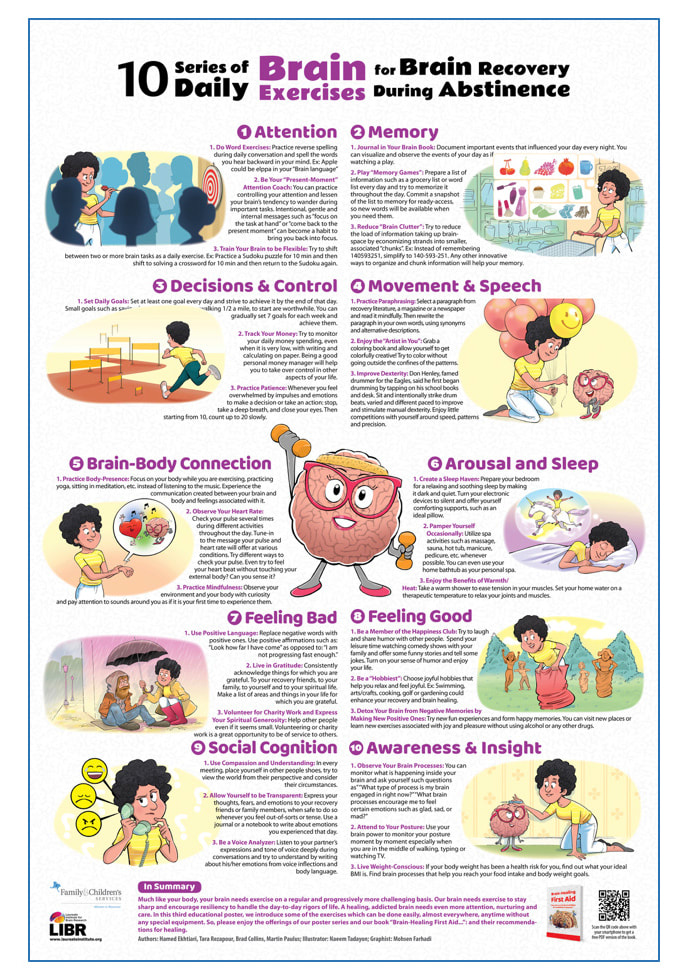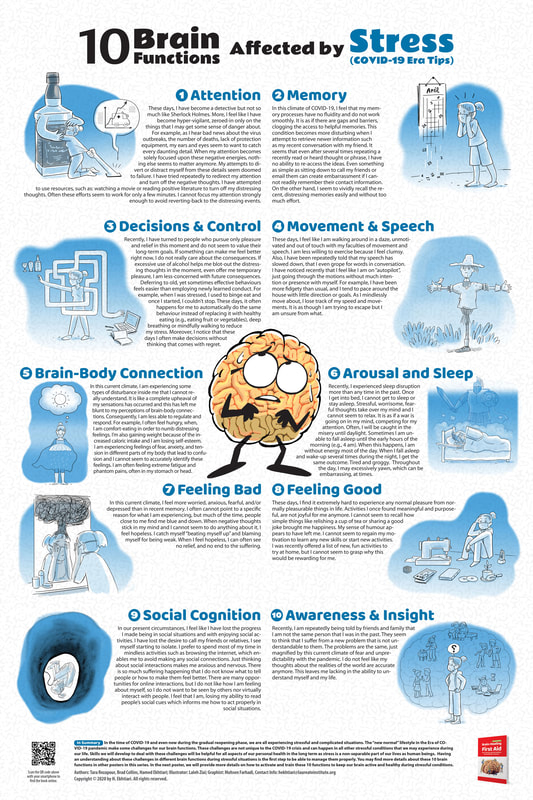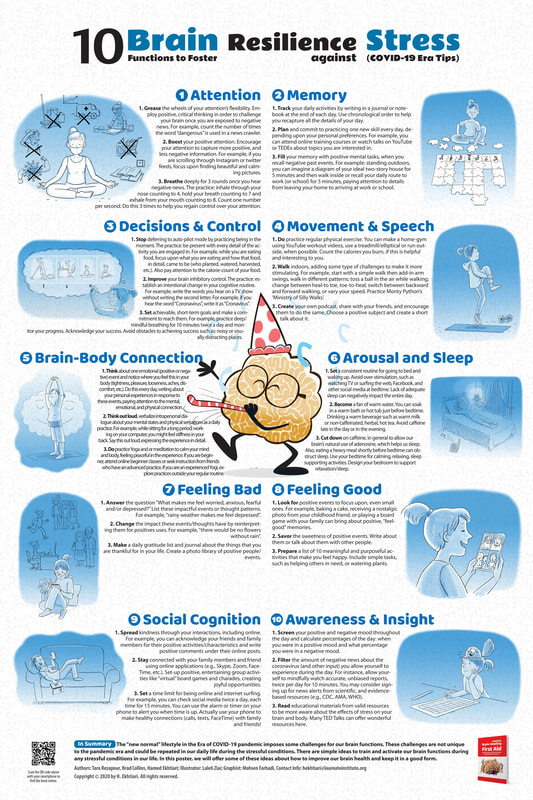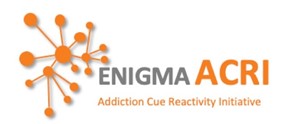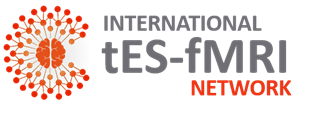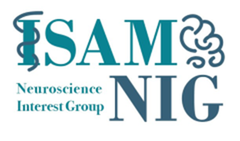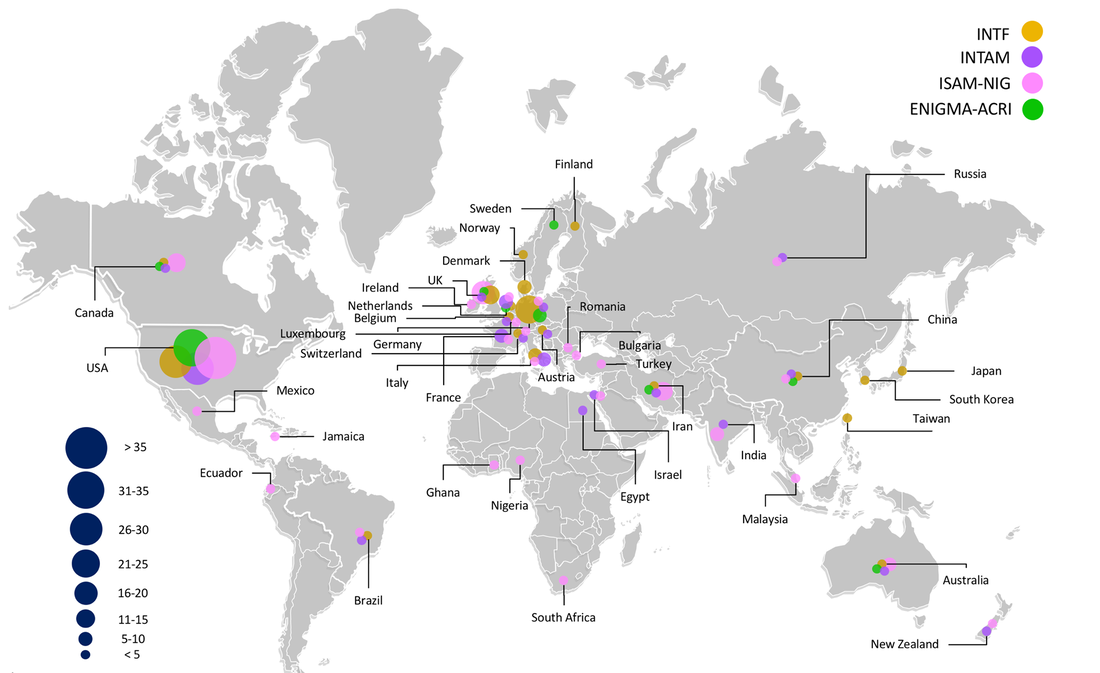Research ApproachDr. Ekhtiari’s main research interests include:
Using neuroimaging/neurocognitive markers among people with substance use disorders to inform development, predict outcome and monitor efficacy of:
|
BARI Awareness for Recovery Initiative (BARI)
As a part of a new metacognitive training intervention for SUDs, coined “brain awareness for addiction recovery initiative” (BARI), in a collaboration with Drs Paulus, Aupperle, and Rezapour and Mr. Brad Collins, Dr. Ekhtiari developed a new standalone, cartooned, brain-based psychoeducation at LIBR. BARI incorporates neuroscience content, using the NIMH Research Domain Criteria (RDoC) as the basic framework. RDoC dimensions include negative valence (e.g., anxiety and loss), positive valence (e.g., reward), cognitive systems (e.g., attention, executive control, and working memory), social processes (e.g., affiliation), and arousal/modulatory systems (e.g., sleep–wake). BARI uses cartoons and affiliated text to incorporate neurocognitive informed structure, targeting different cognitive mechanisms. BARI posters are translated and culturally adopted by scientific authorities in 22 languages in 5 continents.
BARI Posters Are Available in 22 Languages
BARI Posters on Stress and Resilience During COVID-19
|
BARI COVID-19 Posters in English
COVID-19 Era Tips BARI COVID-19 Posters in French
|
Scientific Background
Dr. Ekhtiari admitted to the Tehran University of Medical Sciences (TUMS), the first rank medical school in Iran, as a medical student, after passing the highly competitive national university entrance exam with a rank of 11 out of over 350,000 participants. Facing daily challenges of people with substance use disorder (SUD) in Tehran, he became interested to the neuroscience of cognitive disorders associated with SUDs. He received his first small grant as a medical student in this field in 2000 and published his first paper on the “role of prefrontal cortex in risky decision making” in 2001. He graduated from the medical school with honors in 2004 with a dissertation on the risky decision making and impulsivity. Immediately, he started to work at the Iranian National Center for Addiction Studies (INCAS) in 2004 in one of the least affluent neighborhoods in Tehran and launched a neurocognitive lab there in 2005. He also started a research program at Institute for Cognitive Science Studies (ICSS) in Tehran in 2010 entitled “Translational Neuroscience Program”. He enrolled in a PhD program in neuroimaging at TUMS in 2011 and did his thesis project on the neural basis of response inhibition using fMRI. Then, he moved to the U.S. for a postdoctoral position in the same direction with Dr. Martin Paulus, at the Laureate Institute for Brain Research (LIBR). He promoted to the associate investigator position at LIBR in January 2018.
Dr Ekhtiari started to work in the field of transcranial brain stimulation with an awarded short-term fellowship at Harvard university in 2009. Afterwards, during contribution in different studies using fMRI and brain stimulation, he realized many potentials in this field for understanding causal mechanisms involved in SUD to design therapeutic interventions. In 2014, He published one of the first pieces of evidence on the potential hopes for modulation of drug craving among methamphetamine users with transcranial direct current stimulation (tDCS). His joint review paper on non-invasive brain stimulation and its challenges was published in the Neuron in 2015. In early 2018, He published his preliminary results for the first combined tDCS fMRI study among people with SUD. He completed his first randomized controlled clinical trial in methamphetamine users at LIBR as a PI with tDCS fMRI in January 2019 (NCT03382379). In late 2018, he received the NARSAD young investigator award on “examining the utility of fronto-parietal synchronization (FPS) to enhance self-control to cue induced cravings in individuals with opioid use disorders”. He hopes to extend his activities with transcranial electrical and magnetic stimulation (TES/TMS) technologies using fMRI as a biomarker for prediction and monitoring among people with mental health disorders.
Dr Ekhtiari has also focused intently on the development of cognitive training and rehabilitation programs for people with SUDs. He has recently written a chapter for the world-renowned textbook “Neuropsychological Rehabilitation: The International Handbook” on brain rehabilitation for psychiatric disorders with specific sections focused on SUDs. In 2014, He conducted his first clinical trial of neurocognitive rehabilitation for people with SUD, using a package termed “NEuroCOgnitive Rehabilitation for Disease of Addiction” (NECOREDA) in a collaboration with Mehmet Sofuoglou, Yale University. Results from this study were recently published in 2017. He also recently published a review depicting the future of the field in regards to neurocognitive interventions with SUDs. Based on his background in the field, in a collaboration with Drs. Robin Aupperle and Martin Paulus, he recently developed a new package with more in-depth neuroscience informed interventions called “Neurocognitive Empowerment for Addiction Treatment” (NEAT). In July 2018, he received a three years grant from Oklahoma Center for Advancement of Science and Technology (OCAST) to run a randomized clinical trials among people with opioid use disorder with NEAT as PI.
Dr. Ekhtiari is a passionate teacher and advisor for students who are interested to come to the field of applied clinical neuroscience from different backgrounds, i.e., mathematics, computer science, physics, biology, engineering or psychology. He has been in the advisory board of over 30 MSc and PhD students. Dr. Ekhtiari has three recorded full semester courses on fundamentals of cognitive neuroscience and cognitive neuroscience methods (basic and advanced) in Persian in the Maktabkhooneh website (academic non-for-profit website).
Dr Ekhtiari started to work in the field of transcranial brain stimulation with an awarded short-term fellowship at Harvard university in 2009. Afterwards, during contribution in different studies using fMRI and brain stimulation, he realized many potentials in this field for understanding causal mechanisms involved in SUD to design therapeutic interventions. In 2014, He published one of the first pieces of evidence on the potential hopes for modulation of drug craving among methamphetamine users with transcranial direct current stimulation (tDCS). His joint review paper on non-invasive brain stimulation and its challenges was published in the Neuron in 2015. In early 2018, He published his preliminary results for the first combined tDCS fMRI study among people with SUD. He completed his first randomized controlled clinical trial in methamphetamine users at LIBR as a PI with tDCS fMRI in January 2019 (NCT03382379). In late 2018, he received the NARSAD young investigator award on “examining the utility of fronto-parietal synchronization (FPS) to enhance self-control to cue induced cravings in individuals with opioid use disorders”. He hopes to extend his activities with transcranial electrical and magnetic stimulation (TES/TMS) technologies using fMRI as a biomarker for prediction and monitoring among people with mental health disorders.
Dr Ekhtiari has also focused intently on the development of cognitive training and rehabilitation programs for people with SUDs. He has recently written a chapter for the world-renowned textbook “Neuropsychological Rehabilitation: The International Handbook” on brain rehabilitation for psychiatric disorders with specific sections focused on SUDs. In 2014, He conducted his first clinical trial of neurocognitive rehabilitation for people with SUD, using a package termed “NEuroCOgnitive Rehabilitation for Disease of Addiction” (NECOREDA) in a collaboration with Mehmet Sofuoglou, Yale University. Results from this study were recently published in 2017. He also recently published a review depicting the future of the field in regards to neurocognitive interventions with SUDs. Based on his background in the field, in a collaboration with Drs. Robin Aupperle and Martin Paulus, he recently developed a new package with more in-depth neuroscience informed interventions called “Neurocognitive Empowerment for Addiction Treatment” (NEAT). In July 2018, he received a three years grant from Oklahoma Center for Advancement of Science and Technology (OCAST) to run a randomized clinical trials among people with opioid use disorder with NEAT as PI.
Dr. Ekhtiari is a passionate teacher and advisor for students who are interested to come to the field of applied clinical neuroscience from different backgrounds, i.e., mathematics, computer science, physics, biology, engineering or psychology. He has been in the advisory board of over 30 MSc and PhD students. Dr. Ekhtiari has three recorded full semester courses on fundamentals of cognitive neuroscience and cognitive neuroscience methods (basic and advanced) in Persian in the Maktabkhooneh website (academic non-for-profit website).
Selected Publications
Research Collaborators
|
Ali Farhoudian
INCAS, TUMS Felipe Fregni
Harvard University Irene Jillson
Georgetown University Javad Hatami
ICSS |
Kaveh Ashenayei
University of Tulsa Majid Nili Ahmadabadi
University of Tehran Marom Bikson
City University of New York Mehmet Sofuoglu
Yale University |
Tara Rezapour
ICSS Michael Nitsche
Dortmund University Mohammad Ali Oghabian
NIAG, TUMS Vincent Walsh
UCL |
Research Network
|
Dr. Ekhtiari is contributing to 4 International Virtual Collaborative Networks for Neuroscience (ViCoNs) as co-chair or director. These ViCoNs are designed to promote methodological rigor, transparency, reproducibility and collaboration to ultimately increase the quality of the scientific activities and outcomes.
ENIGMA ACRI: ENIGMA addiction cue reactivity initiative (ACRI) is launched in 2018 to explore potentials in the fMRI drug cue reactivity (FDCR) studies to find new biomarkers and treatments for drug addiction. Fostering global consensus on good practices and harmonized standards and facilitating synthesis across studies to enable clinical translation are within the missions of this network. There are over 50 labs from 15+ countries contribute to ENIGMA ACRI. A quality control checklist and a consensus statement addressing various methodological aspects of FDCR research has been recently developed.
INTAM: The International Network of tES/TMS Trials for Addiction Medicine (INTAM) started its activities following two joint meetings in parallel to the New York city neuromodulation meeting (August 2018) and 3rd international brain stimulation conference in Vancouver (February 2019), with over 80 members from 50+ labs around the world.
The INTAM consensus paper with more than 70 authors from 17 different countries around the world proposes guidelines for best practices in tES/TMS studies for addiction medicine. INTAM is running regular quarterly webinars for its members on YouTube. In a collaboration shaped in the NYC Neuromodulation 2020 conference after a panel on “COVID-19 and brain stimulation labs/studies/researchers across the world: Sharing experiences, difficulties, and best practices”, INTAM contributed on a guideline to run tES/TMS labs/clinics during the pandemic. |
INTF: International Network of tES-fMRI (INTF) was launched in early 2019 in response to the rapidly expanding community of researchers doing transcranial electrical stimulation along with functional MRI (fMRI). INTF has over 100 members from 20 countries. You can find videos of the INTF webinars on YouTube.
INTF has recently developed a checklist and reporting standards to evaluate the methodology of concurrent tES-fMRI studies. The checklist and its consensus paper are available here. ISAM NIG: Neuroscience Interest Group (NIG) of the International Society of Addiction Medicine (ISAM) is established in November 2018 to improve the global capability and capacity of neuroscience research and education to promote treatment and prevention of drug addiction.
ISAM NIG has over 200 members and runs quarterly webinars. You can find ISAM NIG webinars on YouTube. ISAM NIG also runs a monthly talk series entitled "In-Love with Addiction Neuroscience”. ISAM NIG has recently put together a special issue in Frontiers in Psychiatry and Frontiers in Neuroscience on Brain and Cognition for Addiction Medicine with 32 articles from 164 authors. ISAM NIG has also published a consensus roadmap on for integrating neuroscience into addiction treatment. |


